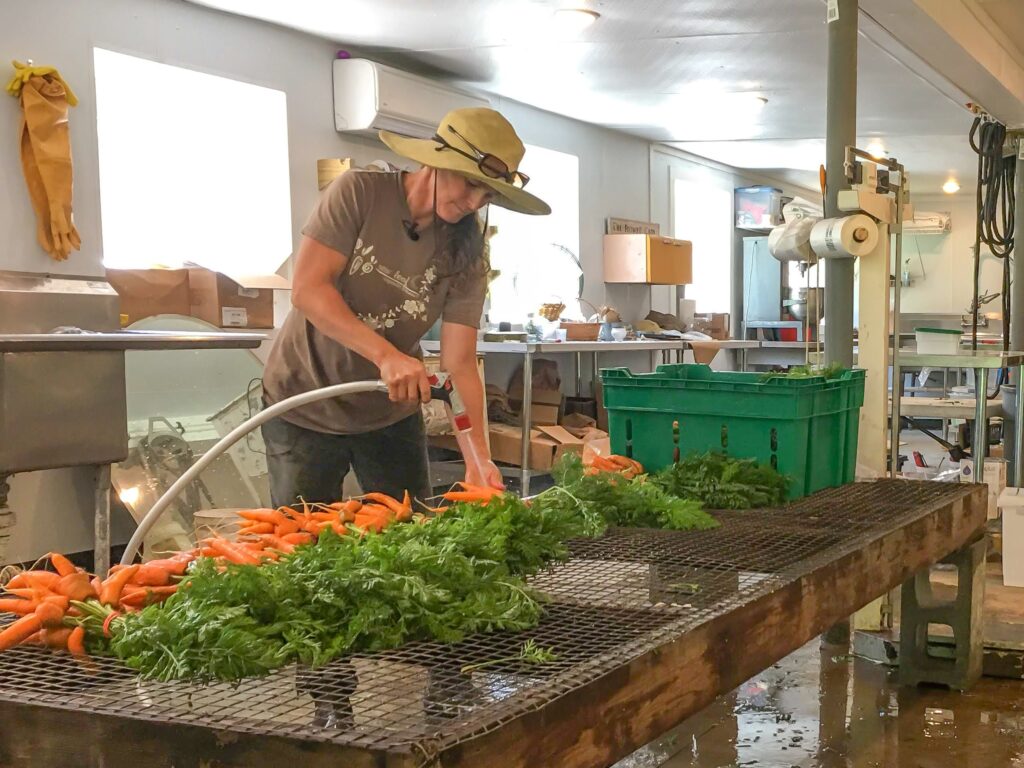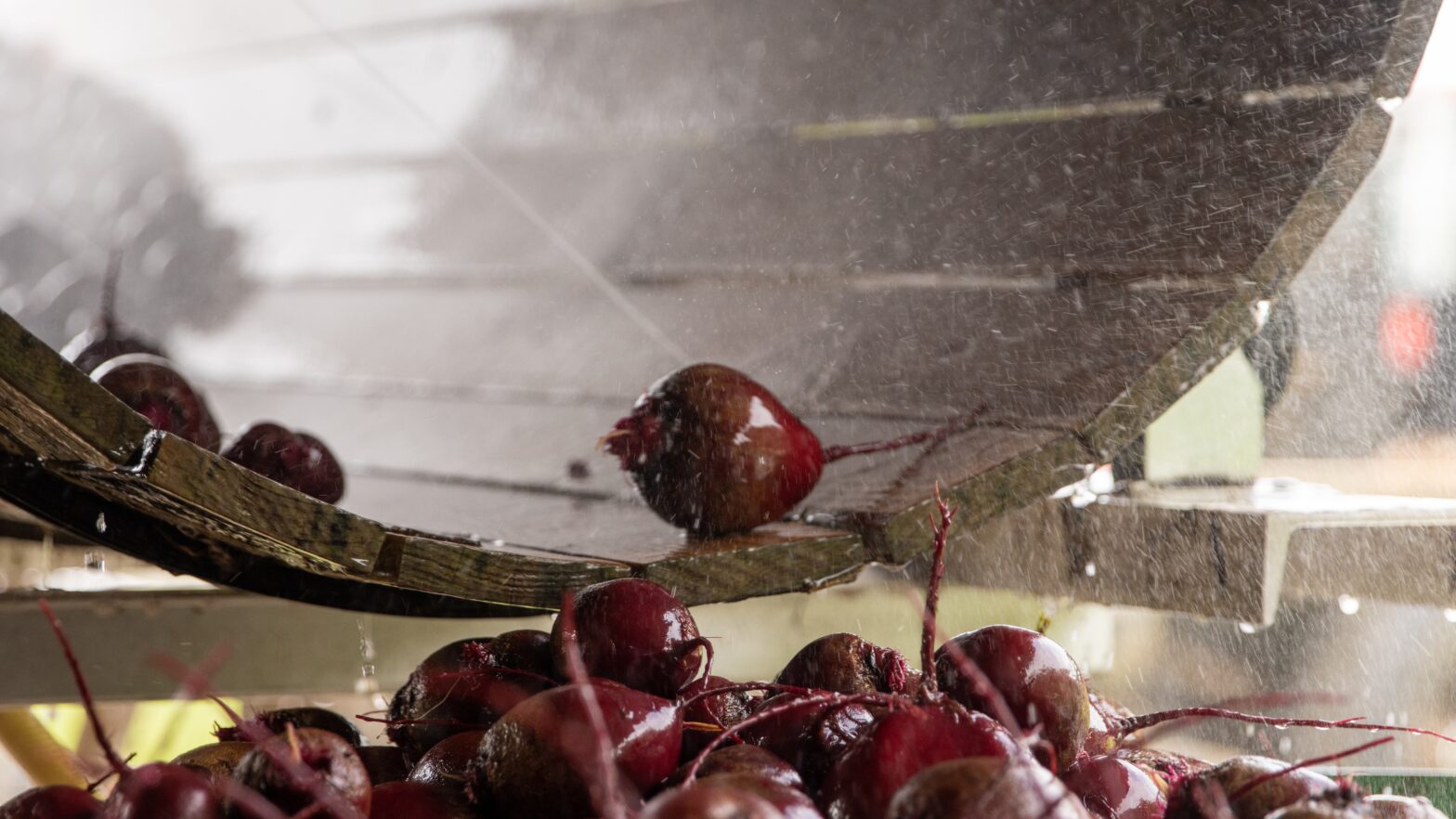There are many ways to wash root crops on produce farms. This guide covers a range of options from smaller farms washing by hand to larger operations with fully automated wash lines.
Watch the Webinar
Root Washing Systems with Hans Estrin | VVBGA Webinar Series
Spray tables

Spray tables are commonly used to rinse bunched produce or crops with relatively high soil load. They are typically made from a porous horizontal material supported by a framed structure. A very common approach is to use 2×4 lumber for framing and either hardware cloth or welded wire fencing stapled to the top. In this blog post we list several different options for spray table materials that are more durable and easier to clean.
Cost: 0-$100
Capacity: 150 bunches/hr
DIY: Low Pressure Hands-Free Bunch Washing
Farmer Jesse shares a hands-free sprayer from Rough Draft Farmstead (Lawrenceburg, KY) which can be assembled cheaply with (mostly) basic plumbing supplies in the video below.
Cost: $100
Capacity: 600 Bunches/hr
DIY: The Bucket Bunch Washer
Sisters Hill Farm (Standfordville, NY) shares this custom setup for cleaning bunched carrots and beets in the video below. This approaches uses an electric pressure washer, a 5 gallon bucket, spray nozzles, and a foot pedal to easily rinse off pre-bunched roots from all sides.. It’s at least twice as fast and saves water compared to a traditional hose.
Cost: 0-$100
Capacity: 600 Bunches/hr
DIY: Barrel Washer
John Hirsh of Clearfield Farm (Granville, VT) made his own small scale barrel washer. It can be operated by one person and has a smaller footprint than larger tumblers. The construction is based off of a harbor freight cement mixer and uses a bundle of furring strips and a bicycle rim.
Learn more from the video:
Cost: $100-200
Capacity: 300 lbs/hr
Taylor & Jake Mendell of Footprint Farm (Starksboro, VT) used Farm Hack Plans to build this barrel washer. No motor needed on this machine, just an old exercise bike and some motivation to turn the drum.
Willsie Barrel Washer
The Willsie washer is a batch cleaning system designed to fit atop a bulk bin. It uses recirculated water from the tank below and turns the metal drum with an enclosed motor.
Cost: $7,000-9,000 (~$800 shipping to VT)
Capacity: 1800 lbs/hr
Wooden Barrel Washer
The most common barrel washer used in the Northeast is Grindstone Farm’s barrel washer kit. These are available as kits or fully assembled for additional cost.
Cost: $3,100-3,450
Capacity: 2,000 lbs/hr
Legs or Stands
Legs or stands have to be custom made. Some use saw horses or cinder blocks when portability isn’t a priority. A few off the shelf options could include a 30” x 96” stainless sorting table which could be outfitted with a flush mount drain to collect the water keeping the floor much cleaner during use.
If you have the space in your wash area for a permanent setup, one option is workbench legs which are available from industrial equipment suppliers.
See This Washer in Action At Mighty Food Farm (Shaftsbury, VT)
Electric Hoist Option
Univerco Mini Barrel Washer
This batch style barrel washer is made with a stainless drum and supported on adjustable legs with wheels for ease of mobility. Learn more on the Univerco website or our blog post: Farmer’s Favorites: Unuiverco Barrel Washer.
Cost: $8,000
Capacity: 2,200 lbs/hr
Poly Barrel Washer
Some growers have concerns about being able to adequately clean a wooden barrel washer. A polycarbonate root washer is an option. This one is produced by AZS Brush Washer (Ephrata, PA). The machines are available in both painted steel or full stainless steel (shown).
Cost: $6,000-8,000
Capacity: 2,000 lbs/hr
Polly Barrel Washer at Jericho Settlers Farm (Jericho, VT)
Univerco Bunch Washer / Rinse Conveyor
This conveyor is made up of 9 sets totalling 40 fixed, spray nozzles to hit bunched root crops (and more) at all sides. This unit runs on 110V AC and is built with stainless steel construction
Cost: $18,200 (~$400 shipping to Vermont)
Capacity: 1,000 lbs/hr
Brush Washer
Root crops can be washed via a brush washer. These machines are generally considered hard to clean by growers and produce safety inspectors.
Cost: $7,000-9,000
Capacity: 600 lbs/hr
Rinse Conveyor
The AZS Rinse Conveyor can be adjusted to wash a variety of crops from leafy greens, bunched roots, or loose crops. It has 3 stages of action to clean produce. 1. High volume rinse. 2. High-pressure spray. 3. Final rinse. You can read more about this machine in this blog post.
Cost: $9,000 (16” wide) $12,200 (24” wide)
Capacity: 1,000 lbs/hr
Steel Barrel Washer
Some growers seek increased durability and cleanability through steel root washers. Typically these are custom built and are included as part of a larger wash line.
Cost: $10,000-20,000
Capacity: 2,000-3,000 lbs/hr
Destoner
Some manufacturers of larger scale root crop wash lines call these tumblers destoners. A bulk bin gets dumped into a tank, and the mud and stones that are present after mechanically harvesting settle to the bottom and are removed via a conveyor.
Cost: $20,000-30,000
Capacity: 3,000 lbs/hr
Complete Wash lines
Often root washers are one part of a larger wash line with bin unloaders, soak tanks, barrel washers, conveyors, sizers, sorting tables, baggers, etc.
There are several manufacturers that put together complete wash lines including:
Allround Vegetable Processing (India)
Automated Produce Equipment (Marietta, Georgia)
AZS (Ephrata, Pennsylvania)
821 Crooked Ln, Ephrata, PA 17522
(717) 733-2584
Duijndam Machines (The Netherlands)
Kronen (Germany)
Univerco (Napierville, Quebec)
Sormac (The Netherlands)
Spiessens (Belgium)
Wyma (New Zeland)
Share this post!
Acknowledgements
This resource was developed as part of the Food Safety Outreach Program under grant number 2020-70020-33003 from the USDA National Institute of Food and Agriculture and also funded, in part, by the USDA Northeast Sustainable Agriculture Research and Education program through award LNE19-375 and by the Food and Drug Administration through The Vermont Agency of Agriculture Food and Markets via the Integrated Extension Educational Programming in Support of the VAAFM Produce Program Grant 02200-FSMA-2018-01. The views expressed in the publication do not necessarily reflect the official policies of the U.S. Department of Agriculture, the U.S. Department of Health and Human Services or the Vermont Agency of Agriculture; nor does any mention of trade names, commercial practices, or organization imply endorsement by the United States Government or the State of Vermont. It is offered without regard to race, color, religion, sex, sexual orientation, gender identity, national origin, disability, protected veteran status, or any other category legally protected by federal or state law.
